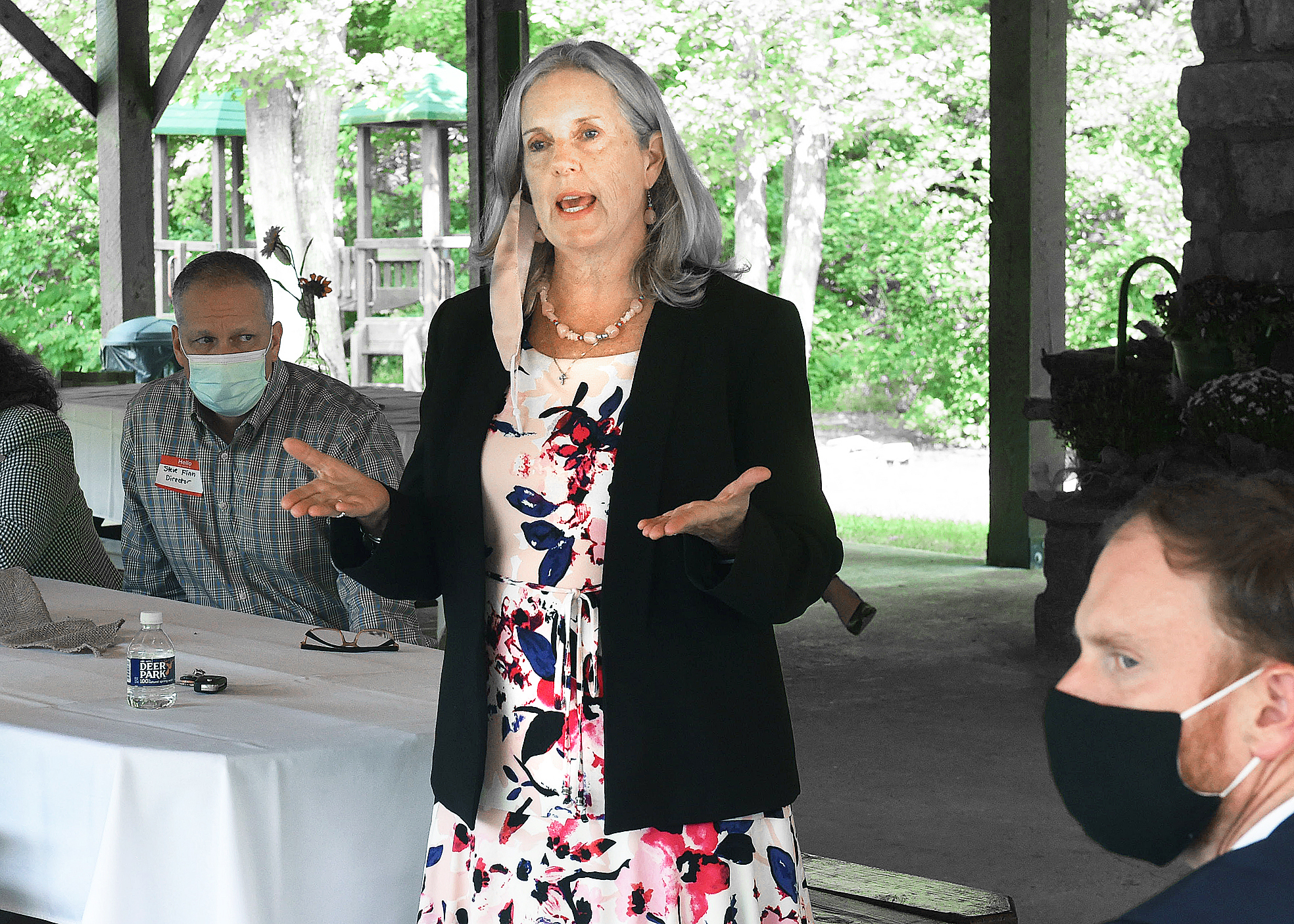MORGANTOWN — Lynn Johnson, assistant secretary at the U.S. Department of Health and Human Services’ Administration for Children and Families, came to Morgantown Thursday to learn about a unique program for foster kids and to promote her effort to find permanent connections for kids aging out of the system.
Her visit to the 300-acre Chestnut Mountain Ranch, just off Kingwood Pike, was part of her two-day visit to the state. She toured the ranch and talked with families whose children have benefited from its faith-based program.
She also visited the Ranch Quick Lube in Sabraton, where boys in the program learn to change oil and serve customers. All proceeds form the shop support the ranch.
After hearing a number of families’ stories she told them, and some legislators and state officials who joined the tour about the importance of educating Congress to provide money to fix the foster care system.
“Coming here to see something like this as opposed to hearing about it makes a huge difference,” she said. “Don’t be afraid to talk to your congressman. Don’t be afraid to go to the Hill. Don’t be afraid to tell your stories.”
Chestnut Mountain Ranch ranch is a board school that generally enrolls children with mild to moderate academic, emotional and/or behavioral problems and provides family support services so families are equipped to stay together and not have boys removed to foster homes. The boys go home to join their families on the weekend.
It currently serves 14 boys who live in two houses on the grounds, but a third house is under construction to expand the number to 21.
“This could be an answer to lessen the foster system,” Johnson said of the program, “I think one of the biggest magic bullets you have is whole-family concept.” Typically, services support the child but not the family, which remains dysfunctional. “We should be able to fund whole families, not this silo case or that silo case.”
Johnson told The Dominion Post that she’s been going to all states to get at the message that every state has kids waiting to be adopted. “Together we can all do this. … Chestnut Mountain Ranch is the most fantastic place and I wanted to see it.” Ranch founder and Executive Director Steve Finn had visited her in D.C. To share the program and that drew her to visit in-person.
In return, Johnson wanted to share the ALL-IN Foster Adoption Challenge, an effort to reduce the number of youth who age out of care without a meaningful, permanent connection – whether that be an adoptive family or a permanent connection with a foster family, grandparents or someone else who can provide a loving, supportive environment.
John said there are 122,000 foster kids awaiting permanency. By going beyond just government welfare programs and recruiting the services of churches and nonprofits, all of them could find a permanent place in just a year.
Brent Wilmoth, who has served on the ranch’s board, said he and Finn have often discussed the need for a Chestnut Mountain Ranch 2.0 to to help 18- to 25-year-olds who leave the system with no skills to enter adulthood and end up making wrong turns in their lives. There needs to be a program that allows employers to meet set qualification to hire foster kids and help them learn skills.
“You’ve got to have someplace to go,” he said. “Turning them out on the streets is part of the reason we see a lot of what we see going on. We’ve got an angry youth that doesn’t know what to do with their time, schools and abilities when they haven’t been developed.”
Johnson said 20,000 kids per year age out and many end up homeless or back in the criminal justice system. And a new problem arose from COVID-19.
Foster kids who were entering college lost places to live when the dorms shut down nationwide, she said. AC&F found itself calling universities to supply some kind of housing for them. “It was a gap in our system that just slapped us in our face. … These kids have got to have somewhere to go before we release them from the system.”
Delegate Steve Westfall, R-Jackson, was among the legislators who attended. He led the House effort to pass the foster care bill and told Johnson how West Virginia’s foster care system swelled by 100 kids per month for two years, much of it do to substance abuse. He asked Johnson if that was a national trend.
She said no, numbers nationwide have decreased in the past two years compared to the prior 15.
Both she and Westfall noted a COVID-related blip, though. With kids out of school, reports of abuse and neglect have dropped according to a survey of 10 states, Johnson said. But it may not reflect an actual decline so much as a lack of information and reporting.
The discussion covered an array of issues but at the end Johnson circled back to ALL-IN. “This is not a hard problem. It is a problem that we just have to be willing to use all partners, make sure kids are safe, and go there.”
It could be done in 12 months, she said again. “We’ve so locked ourselves in to causing our own problems,’ often out of fear. “We have got to get bigger thinking and maybe quit being so risk averse … and take care of our kids. If we don’t do it now I don’t know when it’ll happen.”
Tweet David Beard@dbeardtdp Email dbeard@dominionpost.com




